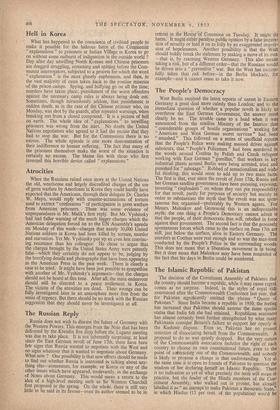Atrocities
When the Russians raised once more at the United Nations the old, wearisome and largely discredited charges of the use of germ warfare by Americans in Korea they could hardly have expected that the Americans, through their delegate Dr. Charles W. Mayo, would reply with counter-accusations of torture used to extract " confessions " of participation in germ warfare from American prisoners. There was some evidence of unpreparedness in Mr. Malik's first reply-. But Mr. Vyshinsky had had fuller warning of the much bigger charges which the American delegation forced on to the UN Assembly's agenda on Monday of this week—charges that nearly 30,000 United Nations soldiers in Korea had been killed by torture, murder and starvation. Yet Mr. Vyshinsky put up an even less convinc- ing resistance than his colleague. He chose to argue that the charges brought by the United States Army were patently false—which they certainly do not appear to be, judging by the horrifying details and photographs that have been appearing in the American Press in the past week. There is clearly a case to be tried. It might have been just possible to sympathise with another of Mr. Vyshinsky's arguments—that the charges should not be heard at this time. After all, the main endeavour should still be directed to a peace settlement in Korea. The victims of the atrocities are dead. Their wrongs can be fully investigated later in an atmosphere more free from the sense of urgency. But there should be no truck with the Russian suggestion that they should never be investigated at all.


































 Previous page
Previous page